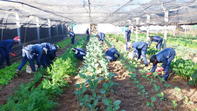
The Basics of Agroecology
The basic principle of agroecology focuses on developing fertile soil and encourages farmers to feed the soil rather than the plant. Agroecology honours traditional and local knowledge, which is dynamic and sensitive and adheres to the indigenous knowledge system of the Iroquois nation, a native American tribe.
Agroecology also acknowledges that agriculture needs to address the 7th Generation Principle. This principle prescribes that the decisions we make today should result in a sustainable world seven generations into the future. This principle further encourages the improvement of healthy soil by reinforcing the fact that we are to focus on soil development and not crop development.
The production practices of agroecology are based on ecological principles and aim to drastically reduce the use of externally‐purchased inputs.
Agroecology uses farming practices such as intercropping, traditional fishing and stock farming (as opposed to the industrial livestock farming model), integrating crops, trees, livestock and fish, manuring, making and using compost, as well as using local seeds and animal breeds.
Agroecology and Farming

Agroecology proposes farming that ‘centres on food production that makes the best use of nature’s goods and services while not damaging these resources.’ Farming thrives and is sustainable when it works with local ecosystems.
The following example illustrates; improving soil and plant quality through increasing organic matter and biodiversity, rather than battling nature with chemical inputs.
Farmers working with agroecology aim to improve soil health and fertility, increase food yields for balanced nutrition, strengthen fair markets for their produce, enhance healthy ecosystems and build on ancestral knowledge and customs.
The Development of Agroecology
Agroecology is not a recent term - it can be identified in scientific literature from the 1920s. More recently, agroecology has entered the conversation of international and UN institutions. It is said that agroecology incorporates political, social, economic and cultural dimensions.
Indeed, agroecology is loyal to the ‘Universal Declaration of the Rights of Mother Earth,’ which was created at the World People’s Conference on climate change in 2010. The Food and Agriculture Organization of the United Nations (FAO) held seminars on agroecology to help guide countries to transform their food and agricultural systems to sustainable agriculture on a large scale.
Agroecology aims to achieve ‘Zero Hunger’ and many other sustainable development goals’ of the United Nations. From these FAO seminars, the following 10 elements of agroecology emerged: Diversity Synergies Efficiency Resilience Recycling Co-creation Sharing of knowledge Human and social values Responsible governance Circular and solidarity economy These 10 elements of agroecology are interlinked and interdependent.
Agroecology in South Africa
It has been found that wherever in the world agroecology has succeeded, the local government has been supportive. Governmental support of agroecology has been the result of strong social movements persuading their governments to put supportive policies in place.
In South Africa, there is a fourth draft ‘confidential discussion document’ of August 2011 linked to organic agriculture of which, the Organic Agriculture Policy is in its 12th draft.
A regulatory framework to govern the sector is called for, in order to increase compliance, transparency, traceability and accountability in support of the widespread production of high quality and safe organic products for the local community and export markets.
By Alan Rosenberg